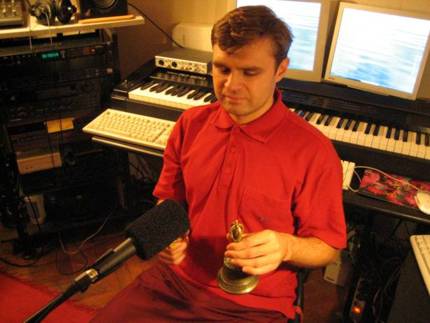|
Lama Sonam Dorje & Anton Batagov DAILY PRACTICE
|
Until the 18th century, most European music was closely connected with spiritual practice. While working with sacred texts, a composer would dare to accompany a canonical melody with newly-composed sounds not to bring aesthetic pleasure to himself or his listener, but instead to penetrate the meaning of these texts and help bring this meaning to life. The process of listening demanded the same approach. Textless compositions had never been based on arbitrary principles, anyway: they were built upon rhetorical figures reflecting the states and motions of a soul immersed in contemplation of the Lord. At best, most music today is geared towards aesthetic enjoyment and emotional expression. Nevertheless, many contemporary musicians are carrying on in the footsteps of their colleagues from several centuries ago, inventing new forms better suited towards modern challenges and modern audiences. Such compositions are based not only on Christian doctrine but on other religious traditions’ ideas and texts as well. Among these composers are Philip Glass, Steve Reich, Arvo Part, and Vladimir Martynov. I, too, am trying to move in this direction. My compositions of this type are based principally on Buddhist philosophy and practice. This CD does not pretend to be musically unique. Our goal was to make a “sonic guide” for daily Buddhist meditation practice. Lama Sonam Dorje chose eight canonical texts and recorded all of them, along with a dzogchen meditation on a sound “A,” in my studio. He then asked me to compose an instrumental accompaniment, along with two textless instrumental pieces: an introduction, and music for daily meditation (tracks 1 and 9). In these compositions I used the rhythmic structure of traditional Tibetan prosody. These rhythmic patterns are usually heard in Tibetan prayers. In the beginning of the 9th track the Lama hits the bell with his vajra to mark the beginning and the end of the meditation. The order of all tracks on this CD was also given by Lama Sonam Dorje. It is certainly possible to play this CD from beginning to end, treating it as a multi-movement composition with its own form, dynamics, dramaturgical principles, and so forth. It is not at all necessary to be a Buddhist to set out on this trip. But if one regards oneself as a Buddhist, this CD is suitable for daily practice. I am extremely happy that I was fortunate enough to meet this person, known in Russian as Oleg and whose Tibetan name is Lama Sonam Dorje. Looking at Tibetans clad in their monastic robes, it might seem unremarkable that they devote their whole lives to spiritual practice while rejecting worldly goals. But when we see our young fellow countryman (he is only 35), who has spent seven years in Buddhist retreat in the Himalayas because he didn’t see the goals in pursuing anything besides spiritual self-perfection for the benefit of other living beings all the while we bused ourselves with careers, business, creativity, families, and various other activities which lead to illusory self-affirmation, something changes in our minds. And when we are reading his books and listening to his lectures, it becomes clear that he spent these years in a very useful way. I am very glad that I can use my modest professional skills in our collaboration to bring some small practical benefit to other people. I don’t know what kind of music came out of this experiment – good or bad. But if these sounds help at least one person experience sincere love and compassion towards other beings it will be much more valuable than all the awards musicians usually get for their achievements.
Anton Batagov
|
